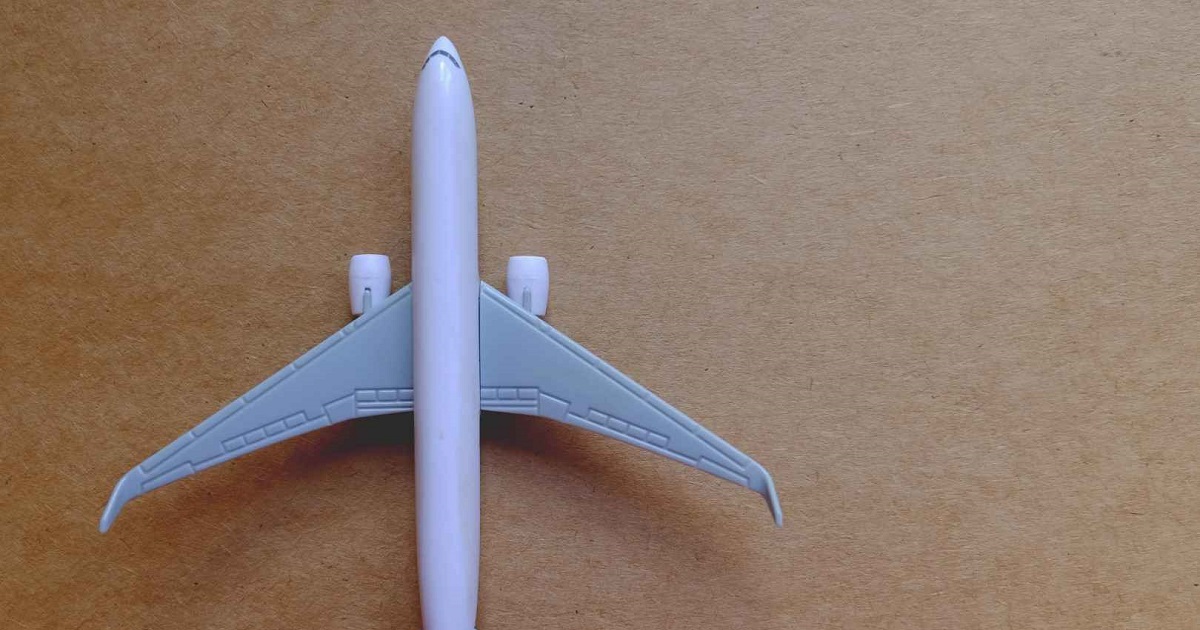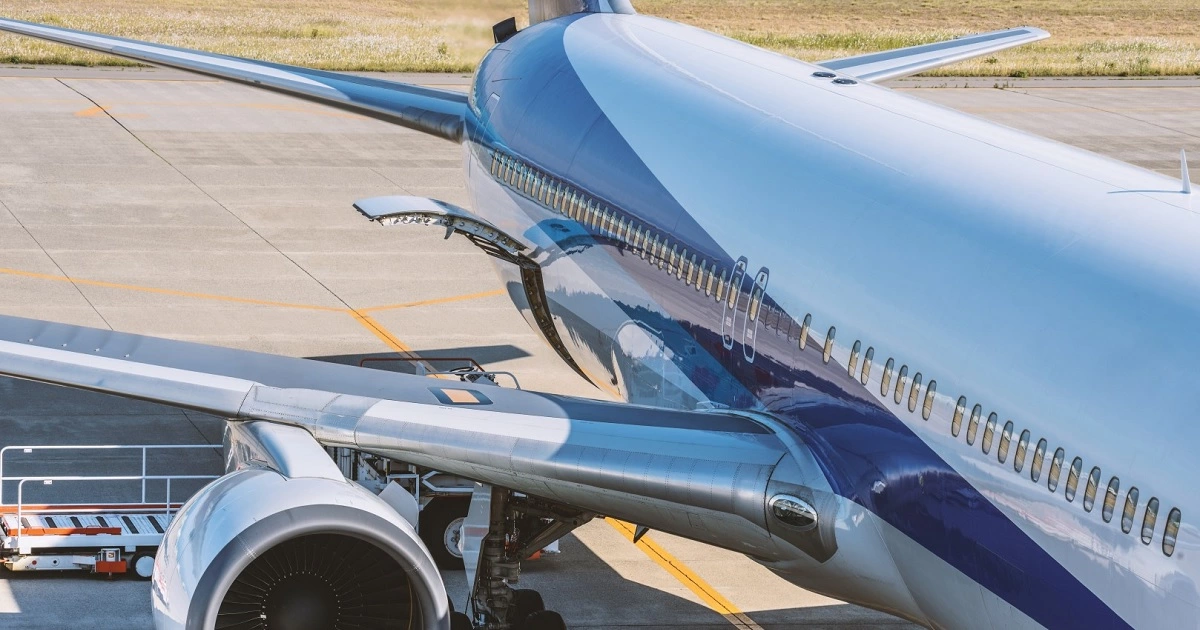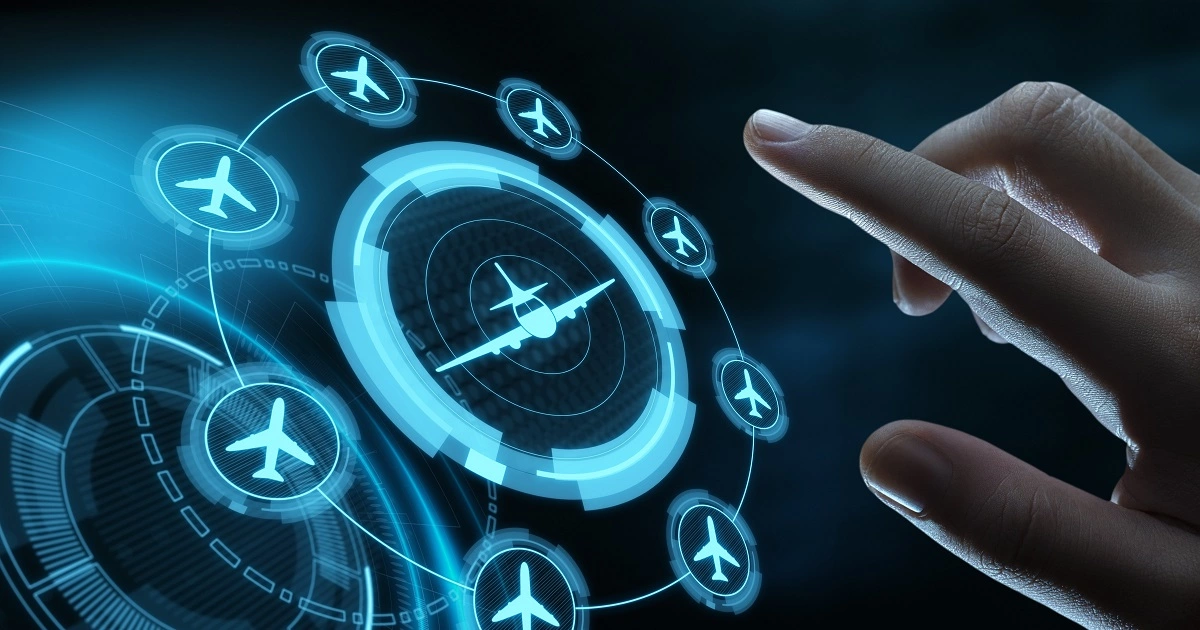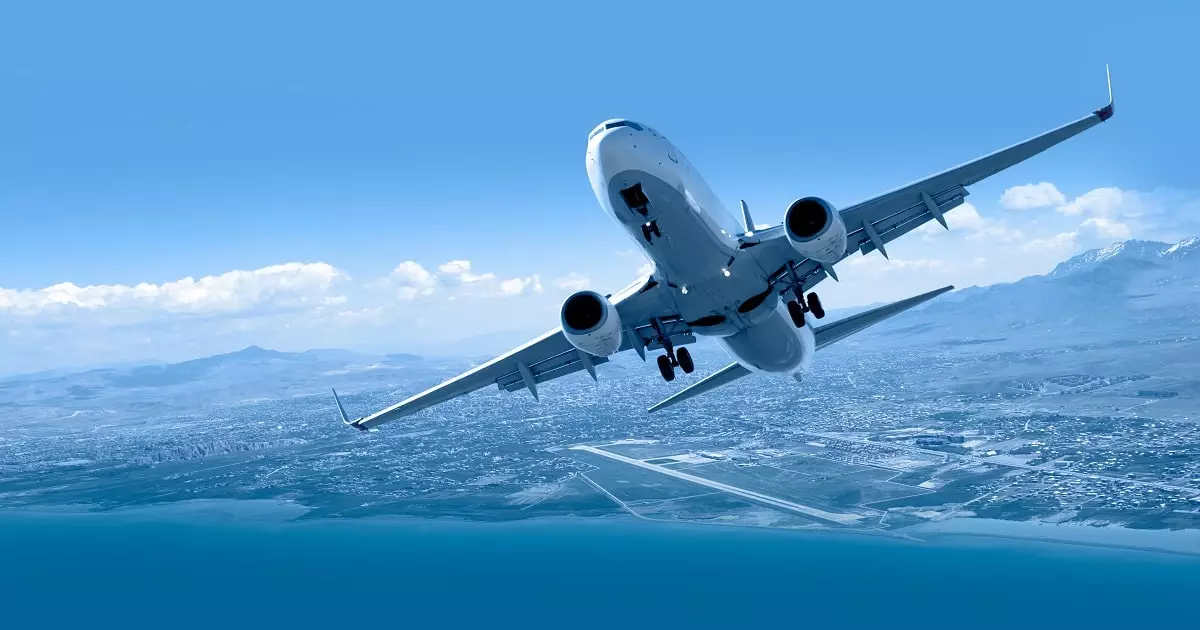
Business Aviation
Article | January 7, 2022
Although airlines only contribute to 2% of global emissions today, research indicates that this number could rise if air travel continues to grow. As such, airlines need to adapt and find new ways to become more sustainable. Successful implementation of eco-conscious strategies will see carriers achieve higher profits and maintain the trust of customers.
SimpliFlying has a long history of helping airlines craft the future of travel and we believe that addressing climate change is essential to rebuilding trust in the aviation industry.
Read More

Business Aviation
Article | December 28, 2021
Airplane travel is one of the most convenient means of transportation. Consequently, air travel is growing, and aircraft need to be more efficient. Furthermore, in the aftermath of the pandemic, the aviation industry appears to be committed to ensuring a sustainable airflight future. So, for this, aircraft need to be more efficient in production costs and fuel consumption.
An aircraft design depends on three of the most critical aspects. The first is the factor of reliability. Aviation is the only industry where it is impossible to overlook, rectify, or investigate a failed flight mechanism on the spot. The second factor is the need to minimize the weight and volume of its components to withstand load and fluctuating temperatures. And, the third factor is that it shows extreme concern from an environmental perspective. Temperatures on the ground can reach 60 °C and even -80 °C in the stratosphere, with supersonic aircraft reaching temperatures of over 200 °C.
As a result of these factors, the aircraft lubrication system and its requirements are critical. From an economic perspective, servicing and maintenance are a significant part of airlines' expenses after the purchase. In addition, the replacement of parts can cause airplanes to remain grounded for an extended period. Such circumstances can lead to a loss of time and money simultaneously.
From a safety aspect, failures at every level should be avoided. Failures like the shutdown of engines or breakage of engine parts can lead to aircraft failures or even crashes. So, by knowing all these issues around air travel, you can easily understand the interest in aircraft engine oil.
An Innovative Lubrication System for Aircraft Engine
Aircraft turbines revolve at up to 18,000 rpm (revolutions per minute). Due to this, internal temperatures can rise compared to the ambient temperature outside. So, aviation engines need an efficient oil-based lubricant to less pollute the environment and sustain long-distance air travel.
Recently, researchers in the EU-funded ELUBSYS project developed a novel way to use specified aircraft engine oil to promote efficiency and reliability. For this, SAF (Sustainable Aviation Fuel) is in high demand. Moreover, the project's innovative oil production will also help reduce an airline’s operating and maintenance costs. In this way, Europe’s aircraft manufacturers are way ahead in supporting future aircraft engine development.
“Aircraft engine turbines rotate at a very high speed with the help of the classic rubberized oil-seals used in the aircraft engine. The extremes of temperature and friction involved would destroy them. Yet aircraft engines need to stay lubricated.”
-Vincent Thomas of Techspace Aero in Belgium
Apart from this, the piston engine looks promising for the aviation piston engine industry. However, it seems like a piston engine holds an optimistic future in fuel economy. Now, with the inclusion of piston engines, there is more importance to using piston engine oil in the lubrication system for an aircraft engine.
So, how piston engine will be the game-changer for aircraft?
Piston Engine—A Game-Changer in Fuel Economy
Numerous aviation firms are developing a new type of internal combustion engine. Such engines promise a notable boost in fuel economy while also plummeting greenhouse gas emissions. In addition, start-ups like EcoMotors, Achates Power, and Pinnacle Engines are building variations on piston engines with the help of specific piston engine oil.
The engines serve as combustion chambers where fuel is ignited. That makes engines lighter in weight and faster in their operations with greater power density. In this way, piston engines result in less energy waste and thus operate more efficiently.
“The technology is worthwhile. However, it is a completely different concept compared to conventional engines,”
- Dean Tomazic, Vice President of FEV in Auburn.
There are more success stories from the aviation piston engine industry. These stories predict that, indeed, aviation is going through a significant transformation.
Another significant achievement comes from Pinnacle, based in San Carlos, Calif. It is developing a four-stroke, gasoline opposed-piston engine. The company’s founder, Monty Cleeves, invented a sleeve valve that ensures energy is used for propulsion instead of getting wasted after converting into heat.
Functions of the Lubrication System for Aircraft Engine Oils
What are the significant functions of lubricants in aviation oils and engines?
It is the function that realizes the importance of things. Isn’t it? So, to realize the importance of aircraft engine oils, it’s crucial to show the potential of the aircraft lubrication systems.
1 Friction and Wear Reduction
Lubricants reduce friction and wear in an aviation engine. The aircraft lubrication system deals with cooling, sealing, clearing, and fighting corrosion and rust in the engine.
Airplanes that are used seldom need the thorough protection from rust and corrosion that good aviation oils can provide. Also, frequently flying airplanes need lubricants for smooth engine operations and functions to avoid failures.
2 Acts as a Cooling Agent
But it is critical to use good aviation oils as lubricants. Oil is a heat-transform medium. Thus, a suitable oil should be used so that lubricants can keep the engine cool and smooth.
3 A life Saver of Aircraft Engines
Lubricants help in extending the life span of an aircraft engine. If an aircraft uses good aviation oil, for example, SAF, biofuels, and more, then there are fewer chances of any engine repairs. In this case, piston engines are the best fit for aircraft with high demand. Piston engines use highly lubricant piston engine oils, which increase the longevity of aviation engines.
Let’s look at some key takeaways from the market study of aircraft engine oil.
Aircraft Engine Oil: Key Takeaways from its Market Study
Commercial planes and business jets will likely witness high aircraft lubricant oil sales.
According to IATA, mineral oil demand is expected to rise by 25% by 2030.
Bio-based oils will dominate the aviation industry in response to soaring environmental concerns.
Maintenance, repair, and operations (MRO) activities will emerge as crucial parts of aviation to drive the global aviation lubricant market.
Lastly, what’s understood is that aircraft engine oil is the engine's lifeblood. Thus, the engine must function efficiently to encompass the length between overhauls.
Frequently Asked Questions
What does engine oil do in an aircraft?
Engine oil functions as a coolant. Up to 40% of an aircraft’s cooling comes from engine oil. Oil creates a seal between the piston rings, which reduces wear and friction andprovides better compression with increased fuel efficiency.
How is the engine oil lubricated?
Engine oil is lubricated with seals using air, which holds back the oil. Air and oil need to be separated. The air eventually vents out in the form of heat. That is why good oil is necessary for aircraft for lubrication.
What are the essential functions of engine oil?
The essential functions of engine oil are:
Minimizes friction and reduce wear
Cleans the engine
Transfers heat
Prevents corrosion
Forms a seal
Cools the engine parts
Read More

Air Transport
Article | July 26, 2022
A New System That Aims to Create Carbon-Neutral Aviation
Scientists have achieved an amazing breakthrough in the development of carbon-neutral fuel for the aviation industry. An aviation fuel production system that uses water, sunlight, and carbon dioxide has been put into action. Its design was published on July 20th, 2022, in the journal Joule. The dream of achieving carbon-free aviation could become a reality with this development.
“We are the first to demonstrate the entire thermochemical process chain from water and CO2 to kerosene in a fully-integrated solar tower system.” - Aldo Steinfeld, Professor, Study Corresponding Author, ETH Zurich
The aviation industry accounts for approximately 5% of the global anthropogenic emissions that contribute to global climate change. The industry heavily relies on kerosene, commonly known as jet fuel, a liquid hydrocarbon fuel derived from crude oil. There are no clean options to power commercial flights on a global scale at the moment.
Production of Synthetic Kerosene
This breakthrough, with the help of solar energy, makes it possible to produce synthetic kerosene from water and carbon dioxide instead of crude oil. The amount of CO2 emitted during kerosene combustion in a jet engine equals what is consumed during its production in the solar plant. It is what makes the fuel carbon neutral, especially if the CO2 in the air is captured and directly used as an ingredient, which could be possible in the near future.
As part of the European Union's SUN-to-LIQUID project, Steinfeld and his colleagues put forward a system that uses solar power to generate drop-in fuels—synthetic alternatives to fossil-derived fuels like kerosene and diesel. Solar-produced kerosene is consistent with the current aviation infrastructure for allocation, fuel storage, and use in jet engines. It can also combine with fossil-derived kerosene, according to Steinfeld.
High Hopes for the Future
Steinfeld and his team began scaling the construction of a solar fuel manufacturing plant at the IMDEA Energy Institute in Spain half a decade ago. The plant has 169 sun-tracking reflective panels that redirect and concentrate solar radiation into a tower-mounted solar reactor. This concentrated solar energy then powers redox reaction cycles in the reactor’s porous ceria structure, which is not absorbed but can be reused. It transforms the water and carbon dioxide into syngas, a customized mixture of hydrogen and carbon monoxide. This syngas is then injected into a gas-to-liquid converter and is finally converted into liquid hydrocarbon fuels such as kerosene and diesel. Steinfeld and his team are working on amping up the reactor’s efficiency from the current 4% to more than 15%.
Read More

Business Aviation
Article | January 7, 2022
The aviation industry has allowed people to connect the world in unimaginable ways. Due to this, it has contributed massively to social and economic development globally.
However, the aviation sector produces nearly 1.8% of annual carbon emissions. It is almost half of the total growth in carbon dioxide emissions in the last twenty years due to the expansion of flights, increasing routes, and airline sizes.
In the loop, the commercial aviation sector has also been affected by climate change. The change is due to increased noise levels, air pollution, and waste production.
According to the International Energy Agency (IEA), the industry recorded 2.8% of global CO2 emissions in 2019. But now, the industry has pledged to be carbon neutral by 2050 through a focus on a critical low-carbon strategy, says IATA. By looking at this futuristic development, airline businesses are becoming more and more optimistic.
The Action Plan
The aviation industry has taken steps to reduce rising carbon emissions. The industry had framed targets that included carbon-neutral growth before the pandemic. But the pandemic compelled the industry to make some critical decisions. One of them is to fasten the action plan for low-carbon development.
McKinsey recently studied the industry’s emissions. According to the report, the industry's aviation emissions would be reduced by 18 to 35 percent by 2030. However, as the aviation industry’s growth is recorded from Asia, including India, China, and Southeast Asia, decarbonization can only work if airlines from these nations actively participate in the development.
“For aviation, zero-carbon is a bold, audacious commitment. But it is also necessary.”
-IATA Director General Willie Walsh
Airlines and other businesses are under pressure to make rapid progress towards lower emissions. It is because breakthrough technology like hydrogen-powered planes has started manufacturing.
For example, British Airways, Delta Air Lines, Inc., and United Airlines Holding Inc. have already made net-zero commitments by introducing hydrogen-powered planes. Similarly, JetBlue Airways Corp has set a target of 2040 to introduce low-carbon planes in no time.
So, by looking at above comitments, how will aviation progress in terms of low-carbon development? What are those fundamental ways that’ll guide the industry to see a sustainable future in real life?
4 Ways Aviation will Look Forward to Reducing Carbon Emissions
Green Fuel
Aviation considers green fuel as one of the quickest paths to low carbon development. Green fuel can be a game-changer in lessening carbon emission impacts. But, furthermore, it can lead to drastic climate change. Green fuel, also known as sustainable aviation fuel (SAF), is made from renewable sources such as plants or waste.
As per IATA, SAF can cut carbon emissions by nearly 80%.
But specific concerns like cost and availability are equally essential to think about. For example, the United States and other countries consider subsidies to decrease prices and increase supplies. They are practicing this due to limited availability. Also, some airlines are blending small amounts into the fuel they buy for their aircraft.
Other concerns, such as planes running properly on pure SAF, are also highlighted. In addition, flight engines based on petroleum fuel rely on their oily qualities to lubricate parts and function appropriately. So, it's unclear if green fuels offer that amount of strength in their engines to fly a flight.
Despite so many heated concerns (that are valid), the industry still looks good as Boeing (BA.N) studies the above issue. It has even committed to ensuring its planes are certified for 100% SAF by 2030.
242
Lower Carbon Technologies
Technological improvements to lower carbon emissions include retrofitting existing aircraft, adopting the latest fuel-efficient aircraft, retiring old aircraft, and others.
Several ongoing electric or hybrid-electric aircraft technology projects are in the pipeline. They are being identified to enter the industry between 2022-2030. In contrast, some of them are already in service.
Developments in Infrastructure
The International Civil Aviation Organisation (ICAO) has created plans to reduce fuel burn and greenhouse gas emissions (GHGs). The plans have been forwarded to optimize communication, navigation, surveillance (CNS), and air transport management (ATM) regarding zero-carbon development.
Apart from this, airlines are also working to align emission cuts with investments. Consumption of fuel usually covers 20-30% of operational costs. It is one of the highest costs of an airline business. So now airlines are considering adopting fuel-efficient flying and airport operations.
Collaborations
Today, aviation needs more stakeholders for a sustainable future. They can only increase the efficiencies and development of SAF.
Stakeholders from technology providers, oil companies, and energy production could drive demand and help bridge the cost gap. For instance, airlines commit to buying SAF at a particular price or at a different price than traditional fuel jets. These factors could eliminate market risks for fuel suppliers.
Next, airlines can work with B2B customers willing to pay for the decarbonization initiative. For example, airlines could use loyalty-program rewards as incentives for every customer to choose airlines that use SAF. Collaborations like these can help the industry accelerate its low carbon emission initiatives.
These Top Airlines Commit to Using New Technologies
Aviation industry leaders aim for 30% of the aircraft to operate with the help of new technologies by 2030. They strongly support the introduction of hydrogen and electric-powered planes to the market in order to reduce the industry's carbon footprint.
So, let’s see the airlines and their commitment to creating a sustainable aviation future.
Air New Zealand
Air New Zealand’s initiatives such as True Target Zero accelerate the adoption of zero-emission aircraft worldwide. Air New Zealand is delighted to work with other industry leaders working towards net-zero goals.
“Air New Zealand pledges to put low carbon solutions in place for all our smaller domestic and regional flights in the future. However, we know that the drive to decarbonize the aviation industry is impossible for one airline to tackle alone. Rather it’s a joint venture, and it's all about joining hands together.”
-David Morgan, Chief Operational Integrity & Safety Officer, Air New Zealand
Mokulele Airlines and Southern Airways
Mokulele Airlines, the largest intra-state carrier in America, has already worked for many years as a maven to bring electrification to its air transportation system.
“We are satisfied to join the World Economic Forum in seeking a global public commitment to promoting sustainable air travel.”
-Stan Little, Chairman & CEO, Mokulele Airlines and Southern Airways
Braathens Regional Airlines
The airline has the ambition to make its flights fossil-free by 2030. The airline has included electric planes, and with its partnership with True Zero Aviation, it is taking steps to accelerate towards actual low carbon emissions.
Can Aviation Make a Difference in the New Path of Development?
There are a lot of positive aviation stories from all over the globe. However, aviation also has some barriers to the new path of low-carbon development. Nevertheless, aviation can undoubtedly make a difference by introducing technologies, implementing result-driven strategies, implementing the right tools, and many more.
But from the customers' perspective, choosing to fly less can be another good reason to reduce an individual’s carbon pollution. The reduction can be up to 50% each year. So even avoiding long-distance flight travel could make a significant difference to aviation.
Business travelers could adopt or choose to use virtual meeting technology. These could be other crucial factors limiting the carbon footprint in the atmosphere.
Whatever you choose to opt for, it is high time to contribute to a more sustainable aviation sector for the future.
Frequently Asked Questions
How can airlines reduce their carbon footprint?
Airlines can introduce more efficient aircraft. Efficiency in technological aspects, reduce flight delays, and increase the use of sustainable lower-carbon or alternative fuels. Also, investment plays a vital role here. They can invest in emissions initiatives and promote low-carbon travel.
How can an airline achieve its carbon-neutral goals?
An airline can explore hybrid and electric aircraft technology to reach carbon-neutral goals, reduce carbon emissions using SAF, and embrace fewer flight routes (distance).
Do aircraft harm the atmosphere?
Aircraft create very polluting elements and are highly challenging means of transport. Indeed, air traffic represents less than 2%-3% of the global CO2 emissions, yet it transmits direct CO2 emissions than cars on roads.
Read More